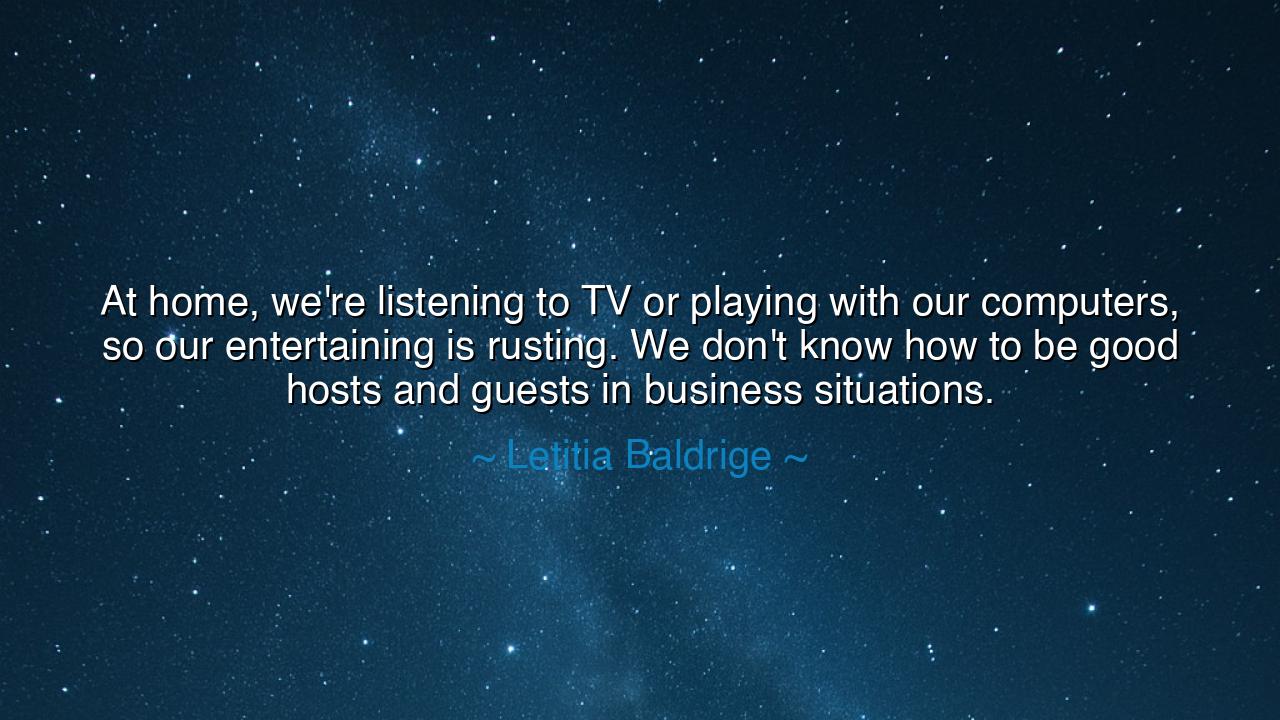
At home, we're listening to TV or playing with our computers, so
At home, we're listening to TV or playing with our computers, so our entertaining is rusting. We don't know how to be good hosts and guests in business situations.






In the refined and cautionary words of Letitia Baldrige, we hear a lament not merely for manners, but for the soul of human connection itself: “At home, we're listening to TV or playing with our computers, so our entertaining is rusting. We don't know how to be good hosts and guests in business situations.” These words, spoken by one of the great authorities on etiquette and grace, carry a wisdom that pierces beyond polite society into the very heart of what it means to be human. For Baldrige, the decay of entertaining — of welcoming others, of conversing, of sharing — was not a matter of lost formality, but of lost warmth. She saw that as people turned toward machines for comfort and communication, the sacred art of human presence began to fade.
In the time of the ancients, hospitality was not merely a custom — it was a virtue, a sacred duty. The Greeks called it xenia, the bond between host and guest that honored both humanity and the gods. To receive a traveler was to receive the divine; to share food and conversation was to affirm the dignity of both giver and receiver. In every culture, from the tents of the Bedouins to the hearths of Rome, the ability to host and to be hosted was a sign of civilization itself. But in Baldrige’s words, we hear the warning that this virtue — once the pride of societies — is now “rusting”, decaying through neglect as modern life grows faster, colder, and more mechanical.
The origin of her insight lies in her life’s work. Letitia Baldrige, known as the “First Lady of Manners,” served as the social secretary to First Lady Jacqueline Kennedy, orchestrating events that reflected grace, diplomacy, and genuine connection. She understood that true etiquette was not about forks and formalities, but about empathy — about making others feel valued and seen. In her later years, as she watched the rise of television and computers dominate domestic life, she observed with sorrow how the home — once a place of gathering and conversation — had become a chamber of distraction. Her warning was not about screens alone, but about what they were displacing: the sacred ritual of human exchange.
Consider the story of the ancient symposiums of Greece — gatherings where poets, philosophers, and citizens reclined together to share food, wine, and thought. These meetings were not mere feasts, but the forging of culture itself. Ideas were born, friendships deepened, and understanding flourished because people met face to face, mind to mind. Contrast this with the modern world, where colleagues dine in silence, each lit by the blue glow of their phones; where families sit at tables without speaking, their attention scattered across devices. Baldrige’s words echo as both a diagnosis and a plea: that we remember how to see one another again, to listen, to host, to connect.
Her reflection extends also to the realm of business, where success often depends not on technology, but on trust. In the days before email and virtual meetings, deals were sealed over dinners, partnerships built through conversation and mutual respect. The art of being a good host or guest in business was an extension of character — the ability to make others feel welcome, valued, and understood. But in a world that has replaced handshakes with hyperlinks, Baldrige feared that the personal touch — the foundation of trust and diplomacy — was vanishing. Without the warmth of human presence, relationships risk becoming transactions, and success loses its soul.
Her words, though spoken decades ago, ring truer with each passing year. The television and computer she spoke of have multiplied into countless screens and platforms, each demanding our attention and eroding our presence. Yet the remedy she offers is simple and timeless. We must practice intentional hospitality — not only in our homes but in our hearts. To turn off the noise, to look into another’s eyes, to listen without distraction — these are not relics of a bygone age, but acts of rebellion against a world that forgets how to feel. The art of hosting begins with care; the art of being a guest begins with gratitude. Both are built upon awareness — the simple act of being fully there.
Let this, then, be the lesson drawn from Letitia Baldrige’s wisdom: to restore the lost art of connection. When you welcome someone into your home, your office, or your presence, do so with full attention. Speak not to impress, but to understand. Listen not to reply, but to honor. In business and in life, remember that success born of sincerity endures longer than that born of speed. The tools of the modern age may aid communication, but they cannot replace the touch of human warmth.
And so, O listener, carry this teaching into your days: let your home be a place of conversation, your table a place of laughter, your meetings a place of respect. The world does not need more machines — it needs more hosts, more guests, more people who remember the beauty of shared presence. As Letitia Baldrige reminds us, when we restore the grace of human interaction, we restore not only civility, but the very soul of society itself.






AAdministratorAdministrator
Welcome, honored guests. Please leave a comment, we will respond soon